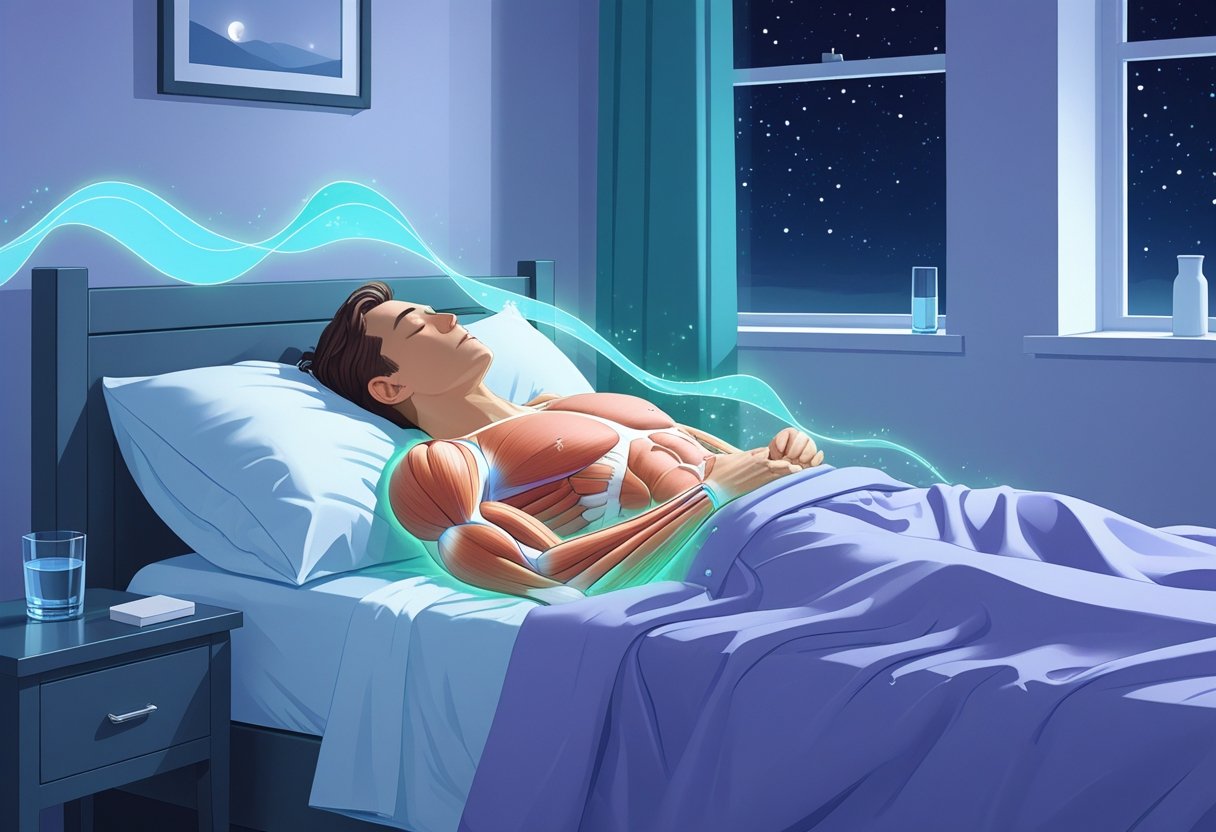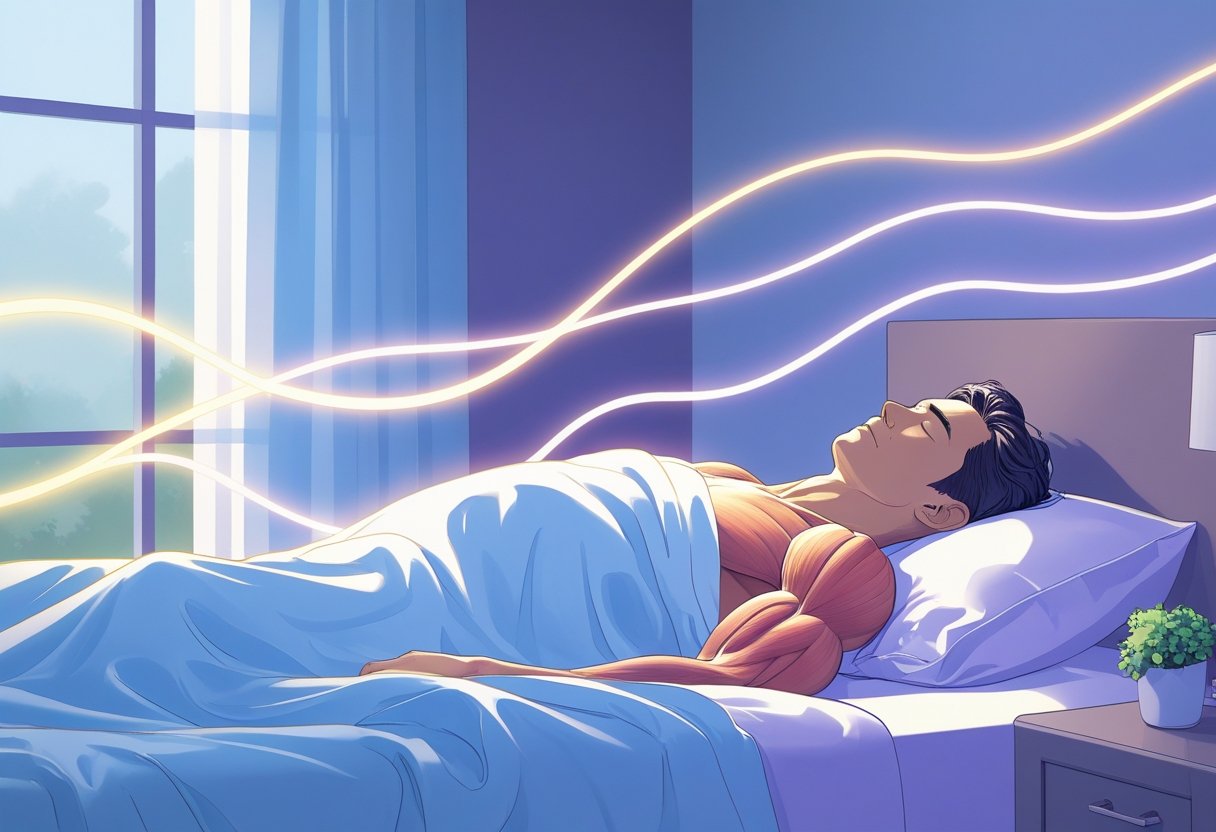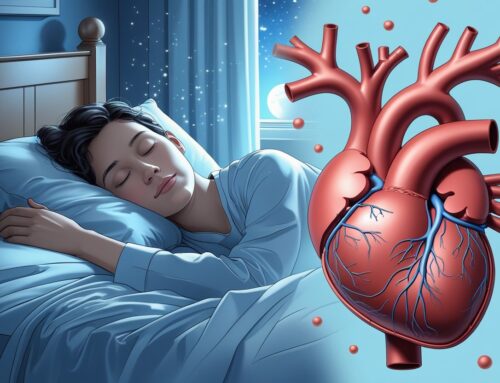Sleep is one of the biggest factors in building muscle. If you don’t get enough of it, your body can’t repair or grow muscle properly. That slows down progress and makes your workouts less effective. Most of the recovery work, including hormone balance, happens while you’re asleep, and that directly affects your strength and muscle size.
A lot of people put all their effort into training and eating right but forget that rest is just as important. Good sleep helps muscles heal, keeps hormones like testosterone in check, and improves overall workout performance. Knowing this makes it easier to see why sleep matters as much as diet and exercise.
Making sleep a priority and sticking to regular rest can make a huge difference. People who sleep well recover faster and notice better gains compared to those who don’t.
Key Takeaways
- Sleep allows muscles to repair and grow effectively.
- Proper rest supports hormones that control muscle development.
- Good sleep habits improve workout recovery and performance.
- Proper mattress support ensures restful sleep and has a vital role in muscle recovery by keeping the spine aligned, reducing pressure points, and encouraging the release of hormones essential for repair.

The Science Behind Sleep and Muscle Growth

Rest is important in muscle repair and growth since it supports recovery and triggers hormone release. It also determines how efficiently the body rebuilds muscle after exercise and maintains strength. Both the quality and amount of sleep influence these processes directly.
How Does Sleep Affect Muscle Growth
During rest, the body focuses on recovery by repairing muscle damage caused by workouts. Insufficient sleep slows muscle recovery, which reduces growth and strength gains. Poor rest limits protein synthesis, an essential process for building muscle fibers.
Research indicates that sleeping less than six hours can lower muscle performance and delay recovery. Quality sleep allows the body to repair tissues faster and preserve muscle mass. This shows both the length and depth of sleep matter for effective muscle building.
Hormonal Influence of Sleep on Muscle Repair
Sleep triggers the release of key hormones that support muscle growth. Human growth hormone (HGH) and insulin-like growth factor-1 (IGF-1) increase significantly during deep sleep stages. These hormones boost muscle size and strength by promoting tissue repair.
Poor sleep quality or shorter duration reduces hormone production, which slows muscle repair. Balanced sleep improves hormone levels and maximizes muscle building, especially after intense workouts or bodybuilding sessions. This hormonal effect makes sleep critical for muscle growth.
Stages of Sleep Relevant to Muscle Building
Deep sleep remains the most important stage for muscle growth. During this phase, the body activates repair processes and releases muscle-building hormones. Slow-wave sleep fixes muscle fibers and strengthens the immune system.
REM sleep, while vital for brain function, contributes little to muscle repair. Light sleep stages provide less restoration and do not support muscle growth directly. Prioritizing enough deep sleep ensures the body recovers fully and builds muscle efficiently.
Recommended Sleep Duration for Muscle Growth
Sleep affects muscle growth and recovery. The amount of sleep affects how well muscles repair and grow after exercise. Both the quality and timing of sleep influence muscle strength and recovery speed.
How Much Sleep Is Needed for Muscle Growth
The ideal range for muscle growth falls between 7 and 9 hours of sleep each night. Studies show that sleeping fewer than 6 hours slows muscle recovery and reduces strength gains. Most muscle repair occurs during deep sleep, so both duration and quality matter.
People who sleep less than 7 hours make slower progress in building muscle compared to those who rest longer. Sleep supports the release of hormones, including growth hormone, which directly impacts muscle development.
Is 7 Hours of Sleep Enough to Build Muscle
Seven hours of sleep could be enough for some individuals to build and maintain muscle. However, the exact amount needed varies based on training intensity, age, and overall lifestyle. Those who train heavily or follow intense workout routines might need closer to 8 or 9 hours.
If sleep quality is good within seven hours, muscle recovery still works effectively. Poor sleep, even if it lasts seven hours, can reduce muscle gains since the body repairs itself more slowly.
Optimal Hours of Sleep for Muscle Recovery
For muscle recovery, aiming for 7 to 9 hours of quality sleep proves most effective. Research highlights that recovery depends not just on hours but also on sleep hygiene and complete sleep cycles. Good habits, like maintaining a consistent bedtime and sleeping in a dark, cool room, improve recovery outcomes.
While asleep, the body repairs microscopic muscle damage and replenishes energy stores. Cutting sleep short increases the risk of injury and delays progress. Recovery works best when total sleep time includes multiple full sleep cycles.

Sleep and Muscle Recovery
Good sleep is a key factor in muscle repair and growth. It supports the body’s natural healing process since it regulates hormones and protein synthesis required to rebuild muscles after exercise. Quality rest reduces muscle soreness while it shortens overall recovery time.
Does Sleep Help Muscle Recovery
Getting good sleep is one of the most important parts of building and repairing muscle. When you rest, your body finally gets the chance to fix the tiny bits of damage that workouts cause. Deep sleep is when your body releases growth hormone, which helps muscles heal and get stronger. This is also the time when your muscles do the most protein-building, which is how they repair themselves.
If you cut your sleep short, that whole process slows down. Your body doesn’t get enough time to do the work it needs, and muscle growth can stall. Over time, you’ll feel more tired and your workouts won’t pay off the same way. Most research says the sweet spot is about seven to nine hours of solid, uninterrupted sleep each night. That’s what gives your muscles the best chance to recover and keeps your energy levels up.
Relationship Between Sleep and Muscle Soreness
Sleep helps ease muscle soreness because it gives your body time to repair and heal. When you work out, tiny tears form in your muscles. Rest is what allows those tears to recover. During deep sleep, your body lowers inflammation, which makes the healing process faster and less painful.
Not getting enough sleep has the opposite effect. It makes soreness last longer and slows down recovery. That’s because poor sleep throws off hormone balance and weakens your body’s ability to repair itself. Making good sleep a priority not only reduces soreness but also keeps your muscles working better so you’re ready for your next workout.

Optimizing Sleep Hygiene for Muscle Building
Good sleep habits let the body recover and build muscle efficiently. Consistency in sleep times and a quiet, dark environment improve both the quality and duration of rest, which support muscle growth.
Establish a Consistent Sleep Schedule
Keeping a regular sleep schedule regulates the body’s internal clock. Going to bed and waking up at the same time each day, even on weekends, leads to better sleep quality. The ideal time to sleep for muscle growth aligns with natural circadian rhythms, typically between 10 p.m. and midnight. This timing allows deeper, restorative sleep during the first half of the night, which is important for muscle repair.
Most adults require 7 to 9 hours of sleep to aid muscle recovery and strength gains. Getting fewer than six hours reduces muscle strength and slows growth. Staying consistent also lowers stress hormones like cortisol that hinder recovery.
Create a Restful Sleep Environment
Getting good sleep is key if you want your muscles to recover and grow. Your bedroom should stay cool, quiet, and dark. Blackout curtains can block streetlights, and a white noise machine can cover sounds that might wake you up. Put your phone or laptop away at least an hour before bed. The blue light from screens makes it harder for your body to release melatonin, the hormone that tells you it’s time to sleep. Comfortable bedding and a space free of distractions also help you sleep longer and deeper.
Simple habits make a big difference. Skip caffeine late in the day and avoid heavy meals right before bed. These changes help you fall asleep faster and stay asleep through the night. With better rest, your body produces more growth hormone, which plays a big role in muscle repair and building.

Consequences of Sleep Deprivation on Muscle Growth

Lack of sleep directly limits the body’s ability to repair and build muscle. It creates a harmful environment in which muscle breakdown rises while recovery slows. These effects become obvious in how the body performs and feels both during and after exercise.
Impact of Insufficient Sleep on Muscle Repair
When someone fails to get enough sleep, their body produces less of the protein essential for muscle repair and growth. This slows muscle recovery after workouts, and the body releases more stress hormones like cortisol, which break down muscle tissue.
Insufficient sleep shortens the time spent in deep sleep, which is the stage most critical for muscle repair. This extends recovery times and reduces overall muscle growth. Studies show that missing even one night of good sleep can lower the rate of muscle protein synthesis. Put simply, poor sleep weakens the body’s ability to rebuild muscle fibers and delays progress in strength and size gains.
Signs of Poor Sleep in Active Individuals
Active individuals who lack sleep often notice slower progress in muscle growth and strength. They feel more tired and lose motivation during workouts. Muscle soreness lingers longer, and the risk of injury climbs. Additional signs include mood swings, lower energy levels, and slower reaction times. These symptoms undermine workout quality, making it harder to stay consistent and pursue progress.
Tracking sleep quality helps spot these signs early. Better sleep supports faster recovery, greater muscle growth, and stronger workout performance.
Additional Factors That Influence Muscle Development
Lack of sleep directly reduces the body’s ability to repair and build muscle. It creates a harmful environment where muscle breakdown increases and recovery slows. These effects become clear in how the body performs and feels during and after exercise.
Muscle growth depends on more than sleep alone. Proper nutrition and effective training routines, together with balanced rest and recovery, play key roles in helping muscles repair and grow stronger.
Role of Nutrition and Training
Nutrition provides the building blocks for muscle repair. Protein intake proves vital since it supplies amino acids that build new muscle tissue. Carbohydrates refill energy stores after workouts, which supports muscle recovery, while fats regulate hormones linked to muscle growth.
Training must remain consistent and progressive. Resistance exercises such as weightlifting cause small muscle tears, which prompt growth once recovery begins. The intensity and frequency should match each individual’s goals and ability to recover. Without proper nutrition to support these efforts, muscle gains stay limited.
Balancing Rest, Exercise, and Recovery
Muscle repair takes place mostly during rest, especially during sleep. Studies show adults need around 7 to 9 hours of quality sleep for optimal muscle growth. Deep sleep stages release hormones like human growth hormone, which promotes tissue repair.
Recovery also requires days away from intense exercise to avoid overtraining and injury. Balancing workouts with rest helps muscles rebuild stronger. Skipping sleep or rest periods slows growth and increases fatigue, which makes steady progress harder.

Mattress Support and Its Impact on Muscle Recovery During Sleep
Mattress support is essential in muscle recovery during sleep. A mattress that provides proper support keeps the spine aligned, which reduces pressure points and prevents discomfort that could interrupt deep rest.
When muscles stay relaxed and the body remains supported, the recovery process becomes more effective. The body releases hormones such as growth hormone during deep sleep, which helps repair and build muscle. Poor mattress support disrupts sleep cycles and limits this essential hormone release.
Key benefits of proper mattress support include:
- Reduced muscle tension
- Better blood circulation
- Greater comfort for longer, uninterrupted sleep
A mattress that feels too soft or too firm places unnecessary stress on muscles and joints. This stress can lower sleep quality and slow muscle recovery. Choosing a mattress that has a balance between softness and support proves essential.
Certain mattresses provide features designed for active people or those recovering from injury. Options like the Brooklyn Bedding Spartan Hybrid include targeted pressure-relief zones and advanced materials to reduce muscle soreness and promote faster recovery overnight. The Brooklyn Bedding Spartan Hybrid combines responsive coils with cooling foam layers. This hybrid design provides firm support where the body needs it most while cushioning pressure points. It also improves airflow to prevent overheating, a common factor that disrupts sleep and recovery.
For athletes or those with an active lifestyle, the Brooklyn Bedding Spartan Hybrid adapts to various sleeping positions and body types. Its durability and balance of support and comfort make it a reliable mattress for waking up refreshed and ready to move. Exploring its features can help find the right mattress to support your recovery journey.

Frequently Asked Questions
Sleep plays a critical role in muscle repair, hormone release, and growth. Both the amount and quality of sleep affect how well muscles recover and develop after exercise.







